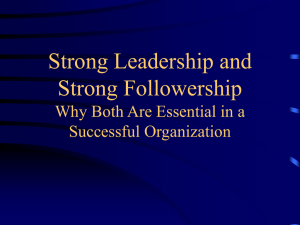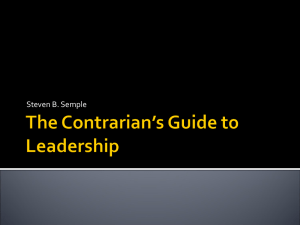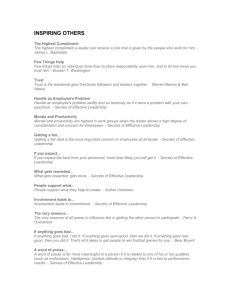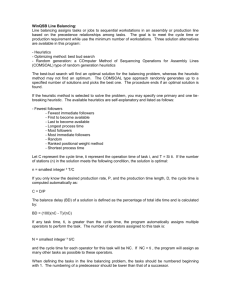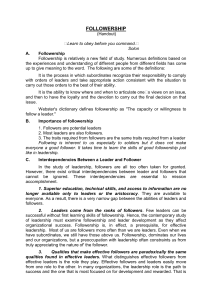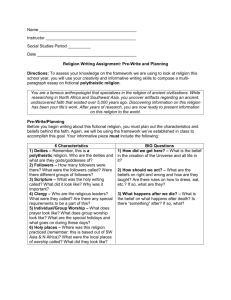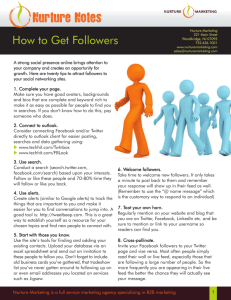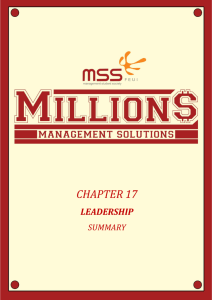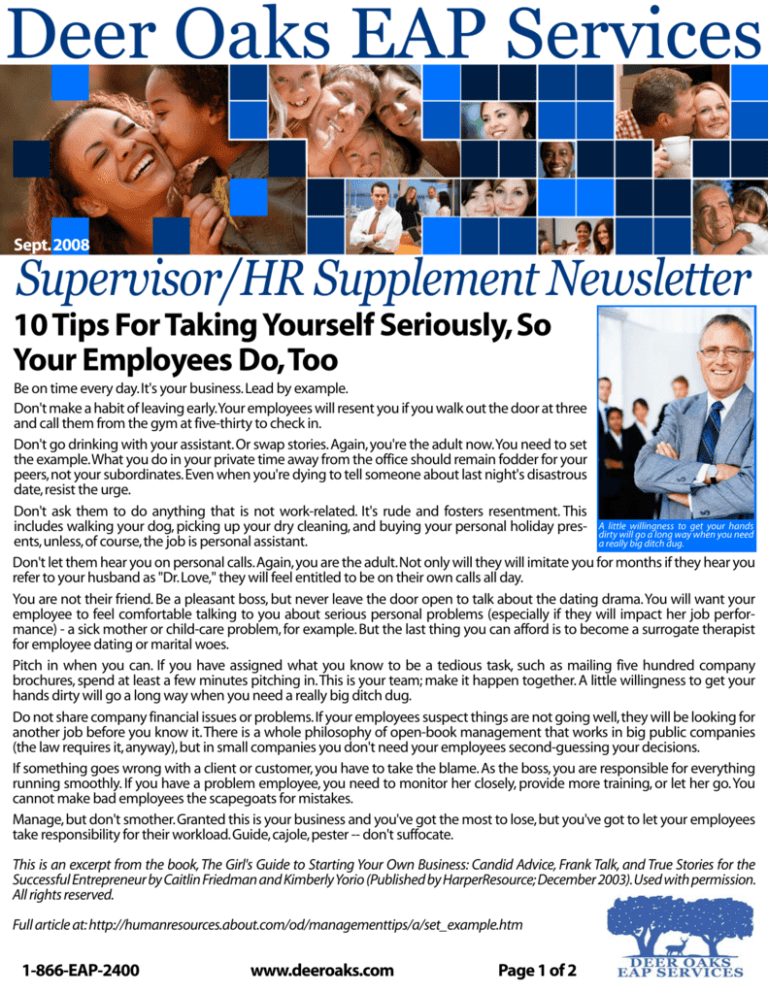
Deer Oaks EAP Services
Sept. 2008
Supervisor/HR Supplement Newsletter
10 Tips For Taking Yourself Seriously, So
Your Employees Do, Too
Be on time every day. It's your business. Lead by example.
Don't make a habit of leaving early.Your employees will resent you if you walk out the door at three
and call them from the gym at five-thirty to check in.
Don't go drinking with your assistant. Or swap stories. Again, you're the adult now. You need to set
the example. What you do in your private time away from the office should remain fodder for your
peers, not your subordinates. Even when you're dying to tell someone about last night's disastrous
date, resist the urge.
Don't ask them to do anything that is not work-related. It's rude and fosters resentment. This
little willingness to get your hands
includes walking your dog, picking up your dry cleaning, and buying your personal holiday pres- Adirty
will go a long way when you need
ents, unless, of course, the job is personal assistant.
a really big ditch dug.
Don't let them hear you on personal calls. Again, you are the adult. Not only will they will imitate you for months if they hear you
refer to your husband as "Dr. Love," they will feel entitled to be on their own calls all day.
You are not their friend. Be a pleasant boss, but never leave the door open to talk about the dating drama. You will want your
employee to feel comfortable talking to you about serious personal problems (especially if they will impact her job performance) - a sick mother or child-care problem, for example. But the last thing you can afford is to become a surrogate therapist
for employee dating or marital woes.
Pitch in when you can. If you have assigned what you know to be a tedious task, such as mailing five hundred company
brochures, spend at least a few minutes pitching in. This is your team; make it happen together. A little willingness to get your
hands dirty will go a long way when you need a really big ditch dug.
Do not share company financial issues or problems. If your employees suspect things are not going well, they will be looking for
another job before you know it. There is a whole philosophy of open-book management that works in big public companies
(the law requires it, anyway), but in small companies you don't need your employees second-guessing your decisions.
If something goes wrong with a client or customer, you have to take the blame. As the boss, you are responsible for everything
running smoothly. If you have a problem employee, you need to monitor her closely, provide more training, or let her go. You
cannot make bad employees the scapegoats for mistakes.
Manage, but don't smother. Granted this is your business and you've got the most to lose, but you've got to let your employees
take responsibility for their workload. Guide, cajole, pester -- don't suffocate.
This is an excerpt from the book, The Girl's Guide to Starting Your Own Business: Candid Advice, Frank Talk, and True Stories for the
Successful Entrepreneur by Caitlin Friedman and Kimberly Yorio (Published by HarperResource; December 2003). Used with permission.
All rights reserved.
Full article at: http://humanresources.about.com/od/managementtips/a/set_example.htm
1-866-EAP-2400
www.deeroaks.com
Page 1 of 2
Lead the Team: How to be the Person Others Follow
Leadership
April 2008 Success Secrets
Leaders are hard to find. They exhibit a unique blend of charisma, vision and character traits that
attract people to follow them. They exhibit the other nine characteristics around which this article
series was developed.
Leaders recognize the need to attract followers. Followership has recently been studied as a key to
understanding leadership. To follow, people must feel confidence in the direction in which the
leader is headed. They are enabled and empowered to do their part in accomplishing the stated
objectives.
Further, leaders people follow are accountable and trustworthy. If progress towards accomplishing
the goals ceases, the leader takes responsibility to analyze the problem – he doesn’t search for
people to blame. So people can have confidence that their efforts won’t be punished if they take
reasonable and responsible risks.
Followers need to believe that, at the end of the journey, they will be recognized and rewarded for
their contribution. The leader must help followers answer the question, “What’s in it for me”?
Successful leaders are honest about the potential risks inherent in the chosen path.They communicate, not just the overall direction, but any information followers need to successfully and skillfully
7 Secrets of Leadership Success
carry out their responsibilities.
1. Leadership is about making things
Occasionally, the leader is the person who is in charge, the founder of the business, the CEO, the 2.happen.
Listen and understand the issue, then
president or department head. Leadership qualities combined with positional power magnify the lead.
Answer the three questions everyone
ability of an individual to attract the all-important followers. In fact, business owners can count on 3.within
your organization wants
a certain amount of respect and followership based on their ownership and title. Longevity, too, answers to.
the goals that will allow you
plays a role in attracting and retaining followers. People who have followed the leader for ten years 4.toMaster
work anywhere in today’s dynamic
business world.
will continue to follow unless they lose trust in the leader’s direction.
5. Be curious.
6. Listen to both sides of the argument.
7. Prepare, prepare, prepare.
Characteristics of a Successful Leadership Style
1.) Choose to lead.
2.) Be the person others choose to follow.
3.) Provide vision for the future.
4.) Provide inspiration.
5.) Make other people feel important and appreciated.
6.) Live your values. Behave ethically.
7.) Set the pace through your expectations and example.
8.) Establish an environment of continuous improvement.
9.) Provide opportunities for people to grow, both personally and
10.) Care and act with compassion.
For complete details on the 7 Secrets on
Leadership Success, please visit:
http://sbinfocanada.about.com/od/smallbusin
esslearning/a/leadershippt.htm
Tips provided by Paul B. Thornton.
President of Be the Leader Associates,
and author of seven books on management and leadership.
For more tips and leadership secrets please visit: http://humanresources.about.com/od/leadership/a/leader_follower.htm
Deer Oaks EAP Services, your Employee Assistance Program, is always available for management
consultations and training on a variety of topics including effective leadership, communication,
and dealing with difficult people. If you have employee related questions or you are interested in
scheduling a seminar for you or your employees, please call 1-866-327-2400.
1-866-EAP-2400
www.deeroaks.com
Page 2 of 2

